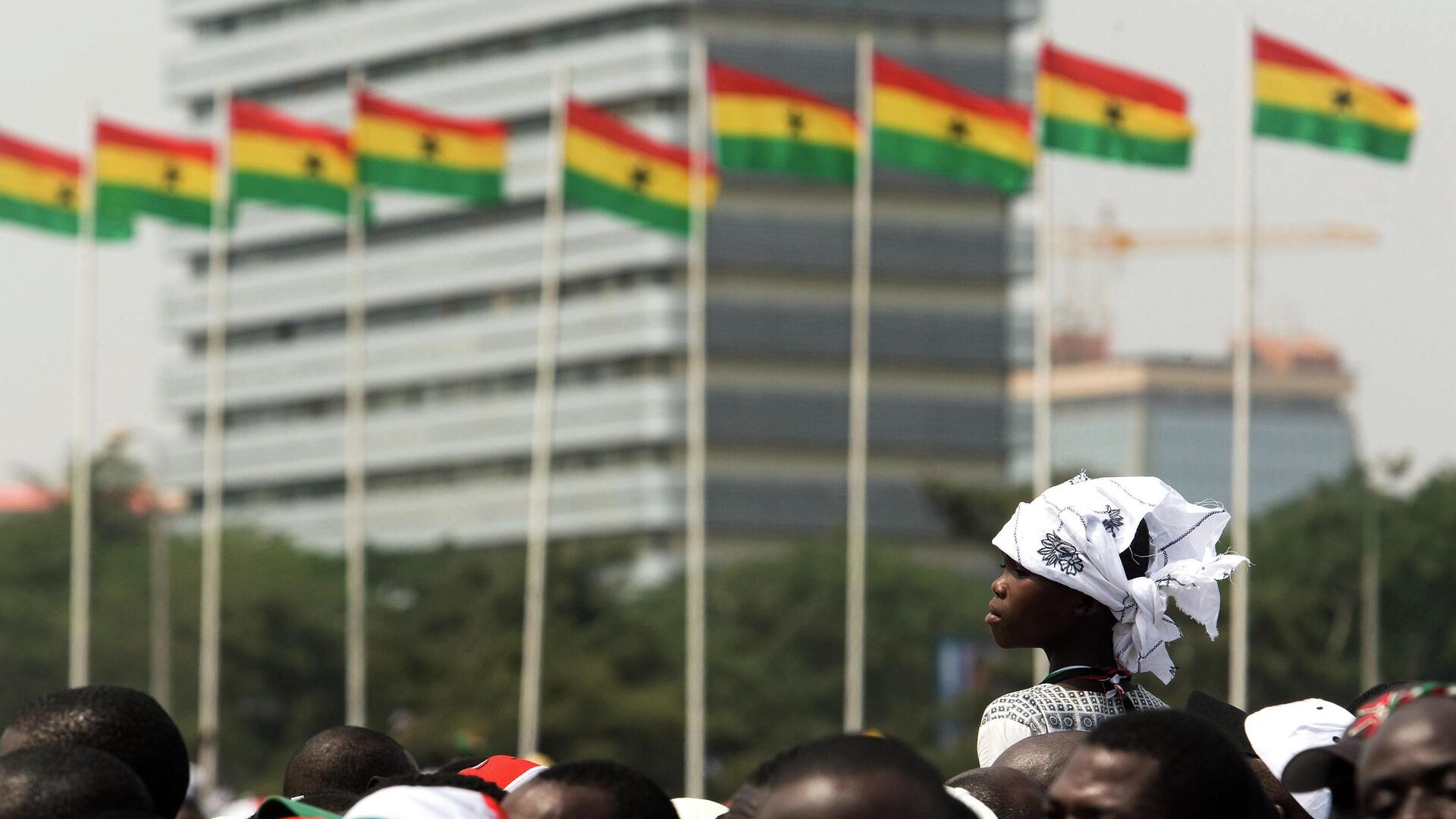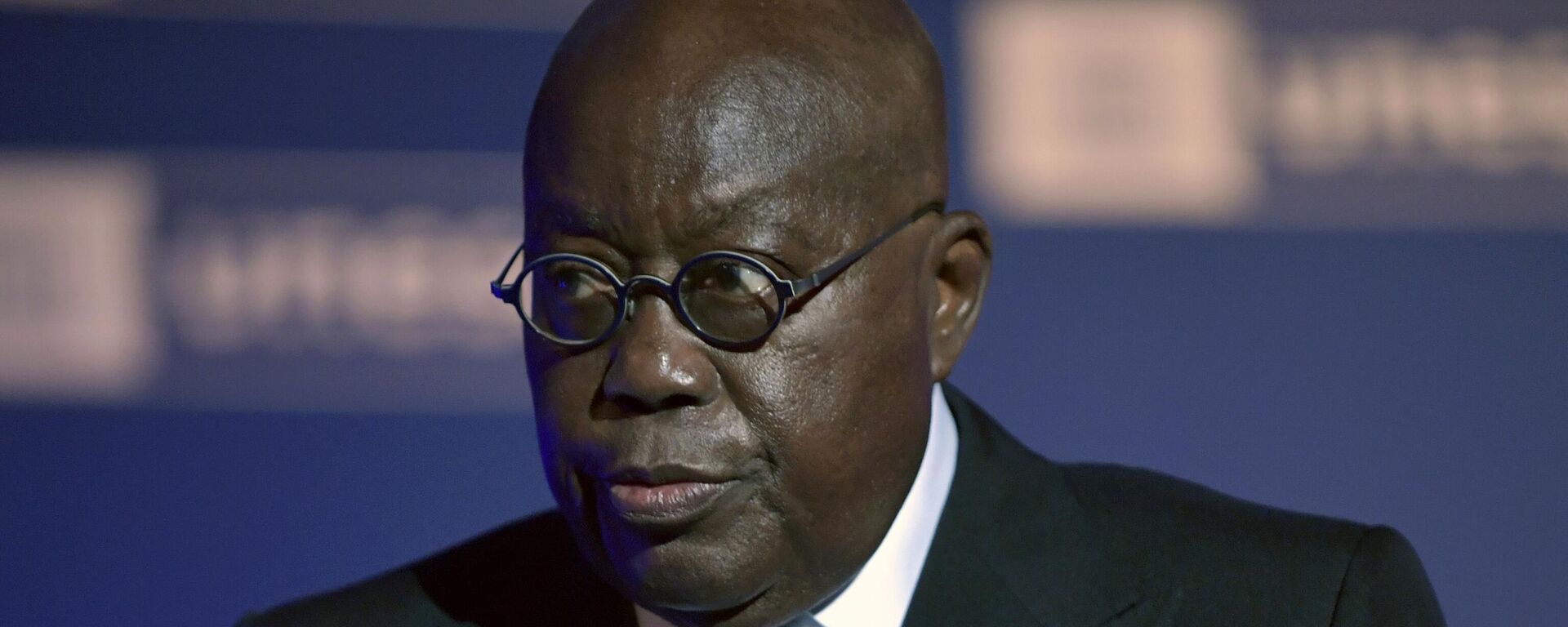https://en.sputniknews.africa/20231012/ghana-records-lowest-inflation-rate-in-12-months-1062722113.html
Ghana Records Lowest Inflation Rate in 12 Months
Ghana Records Lowest Inflation Rate in 12 Months
Sputnik Africa
According to Ghana Statistical Service, the country experienced a "relatively strong economic growth" in the first half of 2023 with the real GDP growth at... 12.10.2023, Sputnik Africa
2023-10-12T14:27+0200
2023-10-12T14:27+0200
2023-10-12T15:44+0200
ghana
sub-saharan africa
inflation
economy
gdp
economic growth
prices
west africa
https://cdn1.img.sputniknews.africa/img/07e7/07/0e/1060537054_0:0:3000:1688_1920x0_80_0_0_8c66e4a5402c1984609579a5b0c07562.jpg
In September, Ghana witnessed a decrease in year-on-year inflation rate to 38.1%, which is the lowest inflation level registered since September 2022 when it was 37%, the Ghana Statistical Service said.According to the data, in August, there was a decline in inflation to 40.1% from 43.1% in July and 42.5% in June. The country registered an inflation drop for both food and non-food prices. In the former category, the inflation decreased from 51.9% in August to 49.4% in September, while the latter shows a decline from 30.9% to 29.3% in the same period.The statistical service revealed that the prices of the tea and related products rose the most, by 117.1%, then come cocoa drinks with the inflation growth by 80% and the fruit and vegetables juices with 62%.Speaking about the inflation rates by country's regions, the service outlined that regarding food, Ghana's North East region saw the highest year-on-year inflation of 73.9% in September, whereas the state's Upper East region witnessed the lowest rate of 35%. As for the figures in the non-food category, the Upper East recorded the highest inflation in September (44.8%), while the Ghanian Ashanti region saw the lowest inflation rate (22%), the statistics demonstrate.In addition, the service revealed that for locally produced items the inflation was 37.3% in September and that for imported items was 39.9%.In late July, the World Bank noted that Ghana is due to regain economic growth by 2025. After slowing down due to the COVID-19 impact, Ghana's economy growth rate leaped from 0.5% to 5.3% in 2021.
https://en.sputniknews.africa/20230620/president-akufo-addo-blames-reckless-credit-rating-agencies-for-ghanas-economic-crisis-1060043044.html
ghana
west africa
Sputnik Africa
feedback@sputniknews.com
+74956456601
MIA „Rossiya Segodnya“
2023
Rasina Musallimova
https://cdn1.img.sputniknews.africa/img/07e7/0a/17/1063019139_0:0:646:646_100x100_80_0_0_348c74b69cf86748a53875f8148a2f85.jpg
Rasina Musallimova
https://cdn1.img.sputniknews.africa/img/07e7/0a/17/1063019139_0:0:646:646_100x100_80_0_0_348c74b69cf86748a53875f8148a2f85.jpg
News
en_EN
Sputnik Africa
feedback@sputniknews.com
+74956456601
MIA „Rossiya Segodnya“
Sputnik Africa
feedback@sputniknews.com
+74956456601
MIA „Rossiya Segodnya“
Rasina Musallimova
https://cdn1.img.sputniknews.africa/img/07e7/0a/17/1063019139_0:0:646:646_100x100_80_0_0_348c74b69cf86748a53875f8148a2f85.jpg
ghana, inflation, economy, gdp, economic growth, prices, west africa
ghana, inflation, economy, gdp, economic growth, prices, west africa
Ghana Records Lowest Inflation Rate in 12 Months
14:27 12.10.2023 (Updated: 15:44 12.10.2023) According to Ghana Statistical Service, the country experienced a "relatively strong economic growth" in the first half of 2023 with the real GDP growth at 3.2% in the second quarter of the year, which is slightly lower than that of at 3.3% in the first quarter. In the same period of 2022, the state's GDP growth rate was at 3.5%.
In September, Ghana witnessed a decrease in year-on-year inflation rate to 38.1%, which is the lowest inflation level registered since September 2022 when it was 37%, the
Ghana Statistical Service
said.
According to the data, in August, there was a decline in inflation to 40.1% from 43.1% in July and 42.5% in June. The country registered an inflation drop for both food and non-food prices. In the former category, the inflation decreased from 51.9% in August to 49.4% in September, while the latter shows a decline from 30.9% to 29.3% in the same period.
The statistical service revealed that the prices of the tea and related products rose the most, by 117.1%, then come
cocoa drinks with the inflation growth by 80% and the fruit and vegetables juices with 62%.
Speaking about the inflation rates by country's regions, the service outlined that regarding food, Ghana's North East region saw the highest year-on-year inflation of 73.9% in September, whereas the state's Upper East region witnessed the lowest rate of 35%. As for the figures in the non-food category, the Upper East recorded the highest inflation in September (44.8%), while the Ghanian Ashanti region saw the lowest inflation rate (22%), the statistics demonstrate.
In addition, the service revealed that for
locally produced items the inflation was 37.3% in September and that for imported items was 39.9%.
In late July, the World Bank noted that Ghana is due to
regain economic growth by 2025. After slowing down due to the COVID-19 impact, Ghana's economy growth rate leaped from 0.5% to 5.3% in 2021.



